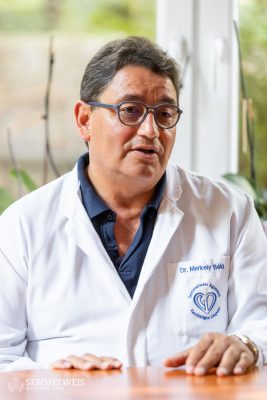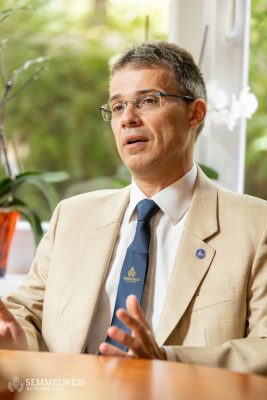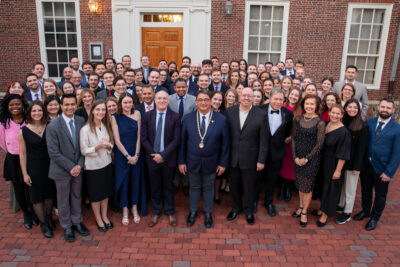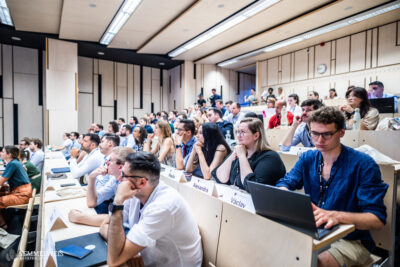In 1983, German-language training in general medicine was launched, followed six years later by English-language training at the then Semmelweis University. In the four decades since then, the proportion of international students and the range of international courses has increased dynamically.
Almost a third of the students at Semmelweis University are international students, and in the academic year 2022/2023 more students than ever before will start their studies in English and German. Currently, all six faculties and doctoral schools of the university offer some form of foreign language training. In addition to Hungary, the institution is also present in five other countries, with off-campus programs in Germany, Romania, Switzerland, Serbia and Slovakia.
The Semmelweis Alumni community of tens of thousands of members supports the development of medicine and health sciences worldwide through their outstanding professional activities.
“Internationalization plays a big role in the life of our university. Mobility is not just an expectation, but one of the bases of our preparation for our profession, our vocation,” stressed Dr. Béla Merkely. The rector added that cooperation is also essential in patient care and research, and the university prepares its students for this as well.
One of the pillars of internationalization is the goal that Hungarian students also spend at least one year abroad, and another is that the university provides a large part of its education to foreign students. This is also particularly important in international university rankings, as these are recognized as a value by all rankings. “In this field, Semmelweis University always ranks among the best, since the education of foreign students is significant both within Hungary and in comparison with other countries,” said Dr. Béla Merkely. Most international students acquire their knowledge at the Faculty of Medicine, the Faculty of Dentistry and the Faculty of Pharmacy.
Foreign students are the ambassadors of our university, as they give positive, authentic feedback about Hungary and Semmelweis University in their home country, which contributes greatly to the fact that their number is significant in the institution every year,” said the rector. And the high-level training provided by the university always remains an asset, as we have seen in times of challenges such as the coronavirus epidemic, he stressed.
The rector emphasized that the strengths of Semmelweis University are tradition, high quality education, practice-oriented and strong theoretical training, good academic performance and the internationality that the university represents. Numerous development have been implemented recently and the university intends to go even further, especially in terms of digitization and modern infrastructure. All these are essential if we are to sustainably deliver the performance we are already known for and even continue to improve,” he added.
Dr. Béla Merkely mentioned clinical research as an example of the importance of international collaborations, which are always multi-stakeholder, based on international relations and usually result in significant scientific activities. Therefore, it is essential that the university takes advantage of the opportunities of everyday international cooperation and brings Hungarian and international students closer together in all fields already during the training.
Students coming from beyond our borders are active not only in training, but also in sport and cultural life of the university. The institution considers community building at the university as a priority in the context of multilingual education. As an example, the rector mentioned that Semmelweis University Sports Club welcomes foreign students as members as well. The number of sports offered by the club is constantly expanding, and the university will host this year’s Medic’s Cup, which will also be an excellent opportunity to celebrate the 40th anniversary of international training,” Dr. Béla Merkely said.
He emphasized that there was no difference in student participation between international and Hungarian students in the fight against COVID-19: international students participated with equal enthusiasm in screening, vaccination and patient care.
Dr. Béla Merkely said that the Semmelweis International 40 series of programs will be internationally significant events for all.
We want to strengthen a sense of belonging, and the scientific, cultural and sport events organized by the university are open to all,”
he added. “The aim of the Semmelweis International 40 project is to look back on four decades of events, both successes and difficulties, to look at where we are now and to set ourselves a clear goal of where we want to go,” the rector concluded.
Regarding the international research cooperation, Dr. Alán Alpár, Vice-Rector for International Studies said that Semmelweis University has become known and recognized in the world not only for its education but also for its role in research activities. “It is very important to conduct research in parallel with medical training and education, and to communicate its importance to the students,” he stressed. These are ideas that foreign students “take with them” when returning to their home country and the momentum they have gained for research here can be used and passed on in their own country, and experience shows that they do so.
The university also backs student integration in education, with over 70 English language courses open to all since 2020. These optional courses are not only a way of gaining credits but also a way of expanding knowledge and networking,” Dr. Alán Alpár told our website.
In the fields of sport, music and art, there is no language barriers,” he noted.
“The university’s international student organizations, such as the Deutschsprachige Studentenvertretung Semmelweis and the International Semmelweis Student Association, actively contribute to the organization of the International 40 events, actively representing the interests of students from abroad,” he said, adding that the university’s ambassadors, i.e. students who have already graduated, are present in 97 countries. He also emphasized that Semmelweis University considers the development and active maintenance of an international alumni network as a priority.
The vice-rector also stressed the importance of trust in international relations. As in the world of science, so in the world of education and education organization, it is important to maintain the old, well-established thoroughness and to strive for development and improvement. The personal reactions of international students who have graduated and the concrete data show that the knowledge acquired at Semmelweis University is also outstanding at international level. Semmelweis University is now one of Europe’s leading English and German-language training institutions. The Semmelweis Diploma is recognized in the European Union and in most countries of the world.
This requires quality. This is how it is possible to attract students also from renowned countries with a long history of medical training to Semmelweis University,”
the vice-rector added.
More information about the anniversary and the International 40 program, which will run throughout the academic year, can be found on the dedicated subpage.
Ágnes Barta, translation by Rita Kónya, Gábor Kiss
Photo: Attila Kovács – Semmelweis University





